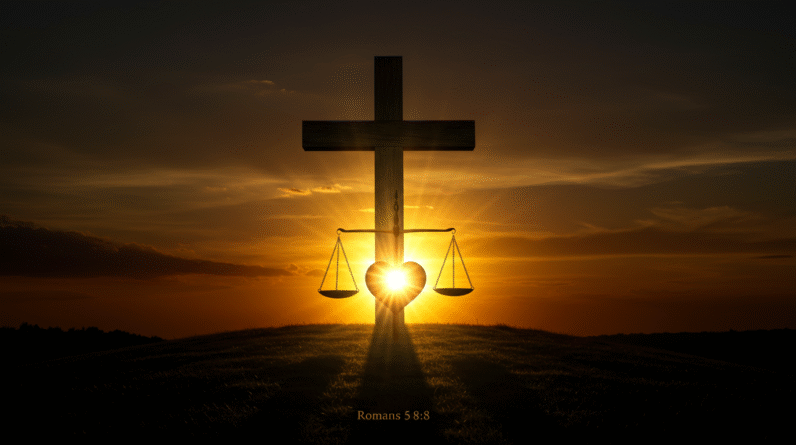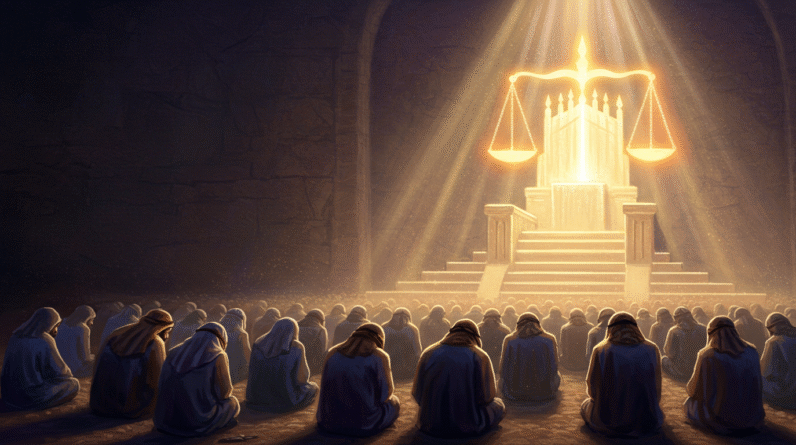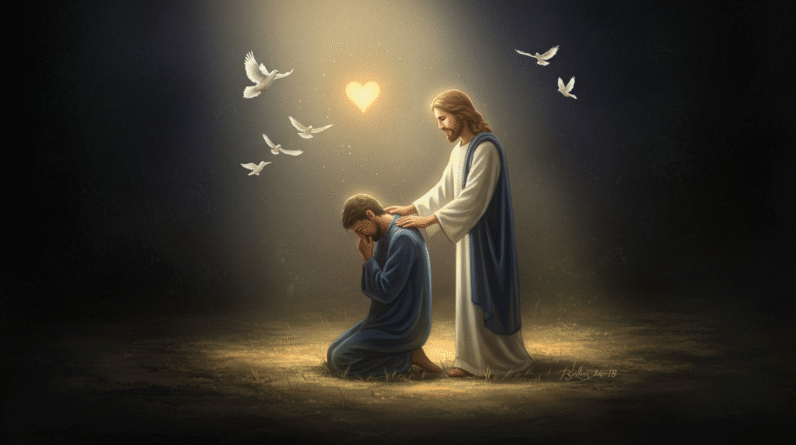urgency.
God’s Love Revealed In Creation (Psalm 33:5)
You may have read Psalm 33:5 before and felt the simple power of those words without stopping to let them shape the way you see the world. The psalmist declares, “The LORD loves righteousness and justice; the earth is full of his unfailing love.” Psalm 33:5. In that one sentence, you find a divine balance: God’s holiness and His compassion, His commitment to moral order and His overflowing kindness. In this study, you’ll explore how creation proclaims God’s love, how justice and mercy meet in His character, and what that means for your life and witness.
Why this verse matters to you
You live in a world that questions both God’s goodness and His fairness. People point to suffering and injustice and wonder whether a loving God could also be righteous. Psalm 33:5 answers that tension head-on: God’s love is not at odds with His justice; creation itself is saturated with His steadfast affection. As you read, you’ll discover how the cosmos, from the rising sun to the human heart, reflects God’s dual commitments—compassion and righteousness—inviting you into worship and obedience.
Reading Psalm 33:5 in context
When you read a single verse, you gain insight; when you read the psalm around it, you gain perspective. Psalm 33 begins with praise for God’s creative power and His sovereign rule: God spoke, and the heavens were made. In the midst of that praise, verse 5 reminds you that the Creator’s activity emerges from a heart that loves what is right and cares deeply for His creatures. See the verse in the flow of the psalm here: Psalm 33:1-9, and then take verse 5 again: Psalm 33:5.
The psalmist’s intent
The psalmist wants you to know God is both powerful and personal. God’s power over the nations and the seas is impressive, but the psalmist insists that this power is exercised in righteousness and love. This truth gives you confidence: the world’s events are not ultimately arbitrary; God governs in justice and compassion. As you consider creation, you will see evidence of both.
“The LORD loves righteousness and justice”
Begin with the first half of the verse: “The LORD loves righteousness and justice.” That statement tells you about God’s moral character. He is not a passive force; He actively loves what is good, fair, and right. Righteousness points to God’s moral perfection, and justice is the expression of that perfection in relationship to others. When you look at the created order, you see a pattern of order, design, and purpose that points back to a God who delights in what is right.
How creation displays order and justice
Creation shows rhythm, structure, and a moral-purpose blueprint. From the seasons to the intricacy of ecosystems, the created order reflects a moral coherence—plants and animals follow patterns that sustain life, and human beings are given responsibilities that require fairness and care. When you study Genesis, you encounter a Creator who establishes roles and boundaries designed for flourishing: Genesis 1:26-27 reminds you that humans are made in God’s image, called to steward creation in ways that reflect God’s righteous rule.
Justice and stewardship
Justice in creation is not merely legalistic; it is relational. God’s justice safeguards the weak and upholds communal wellbeing. When you act justly toward others, you reflect the Creator’s original intention for the world. Micah’s summary of what God requires—“to act justly and to love mercy and to walk humbly with your God”—echoes the psalm’s balance and roots it in daily behavior: Micah 6:8.
“The earth is full of his unfailing love”
Turn to the second half of the verse: “the earth is full of his unfailing love.” The Hebrew word often translated “unfailing love” (chesed) conveys covenant loyalty, steadfast mercy, and enduring compassion. You’re being told that God’s love is not remote; it floods creation. Wherever you look—mountains, seas, stars, human hearts—you find evidence of a God who cares deeply and remains faithful.
Creation testifies to God’s loving-kindness
Psalm 19 begins with the same theme: “The heavens declare the glory of God; the skies proclaim the work of his hands.” Psalm 19:1. Creation is a continuous testimony to God’s care. You can see this in the provision of food, the nurture of families, and the beauty that stirs worship. Paul says even the invisible qualities of God—his eternal power and divine nature—are clearly seen in what has been made, leaving all without excuse: Romans 1:20.
The holistic nature of chesed
God’s steadfast love is relational and practical. It does not merely feel good; it engages with the realities of your life. Psalm 104 shows the Creator who feeds animals, who provides seasons, who makes springs run among the valleys—practical demonstrations of love in the natural world: Psalm 104:24-25. That same love reaches into the moral order, calling you to respond in trust and obedience.

Creation, the image, and moral responsibility
God created you for relationship—with Him, with other people, and with the created world. Being made in the image of God gives you dignity and responsibility. You are a moral actor in God’s drama of redemption. This dignity implies that the patterns of justice and mercy you observe in creation are meant to be reflected in human society.
Image-bearing and ethical response
Genesis’ portrait of humanity implies a calling: to rule and steward creation in ways that reflect God’s righteousness. That calling demands that you act justly, love mercy, and embody humility toward God. When you feed the hungry, advocate for the oppressed, and protect the vulnerable, you mirror God’s character as revealed in creation and Scripture. See the foundational creation mandate here: Genesis 1:28.
Where love and justice meet in Scripture
Throughout the Bible you’ll find that God’s love and justice are never separated. They meet in His covenant faithfulness, in judgment and mercy, and ultimately in Christ. The prophets rebuked Israel when they practiced religion without justice. The psalms praise God for both His righteousness and His steadfast love. Micah, Isaiah, and the Psalms all point you back to the same truth: you serve a God who will not tolerate sin, but who relentlessly pursues restoration.
Examples from the prophets and psalms
Isaiah declares God’s sovereignty in creation and His concern for righteousness: God fashioned the earth for a purpose and calls people to live rightly before Him: Isaiah 45:18. The psalmist insists that God’s throne is established in righteousness and justice, and that lovingkindness surrounds it: Psalm 89:14. These passages form a chorus that teaches you to worship a God whose holiness compels justice and whose heart overflows with mercy.
Jesus: the incarnate revelation of God’s love and justice
If creation shows you God’s attributes in general, Jesus reveals them in person. The Gospel of John begins by identifying Jesus as the Word through whom all things were made: John 1:1-3. He is the exact representation of God’s nature (Hebrews 1:3), and in Him you see both compassion and truth.
Compassion and correction in Christ’s ministry
Jesus healed the sick, fed the hungry, and welcomed sinners—acts of love that flowed from the heart of the Creator. Yet He also called people to repentance, warned of judgment, and overturned the abuse of the temple system—acts consistent with God’s righteousness. Consider John’s summary of God as love: 1 John 4:8 and the Gospel proclamation of God’s plan: John 3:16. In Jesus, you see love that seeks the lost and justice that confronts sin.
The cross: mercy and justice meeting
On the cross, justice and love meet sublimely and heartbreakingly. God does not wink at sin; He addresses it through sacrifice. But that sacrifice is the supreme expression of love—God taking upon Himself the consequences of sin to reconcile sinners to Himself. Paul says God’s love is rich and that Christ’s work reconciles creation to God: Colossians 1:16-20. The cross shows you that God’s justice and mercy are both satisfied in a single, loving act.
Creation groans and the promise of renewal
Creation’s testimony to God’s love does not mean it is free from suffering. Sin has marred the original beauty and order. Yet even the groaning and longing you see in creation points to God’s restorative purposes. Paul writes that the whole creation waits in eager expectation for the children of God to be revealed: Romans 8:19-22. That longing tells you that God’s love is not distant; He intends to renew what sin has broken.
Hope for the renewal of all things
Because the Creator loves with an unfailing love, He will not abandon the world He made. Scripture promises a new heaven and a new earth where righteousness dwells: Revelation 21:1-5. You are invited to live in light of that coming restoration—working for righteousness now while trusting God to complete His purposes.
Balancing compassion and righteousness in your life
You might wonder how to live in the tension between love and justice. The Bible offers practical wisdom: love others sacrificially, but do not ignore truth; seek mercy, but do not tolerate exploitation; pursue peace, but stand for what is right. The godly life is not passive. It engages broken people and broken systems with both tenderness and conviction.
Practical steps to embody God’s heart
Here are a few ways you can let creation’s testimony and Psalm 33:5 shape your life:
- Cultivate wonder: Spend time in God’s creation, allowing it to awaken praise and dependence on the Creator.
- Practice justice: Advocate for the marginalized, support fair policies, and act with integrity in everyday choices.
- Show mercy: Tend to neighbors, forgive freely, and offer practical help to those in need.
- Live sacrificially: Give your time and resources to causes that reflect God’s justice and compassion.
These steps are rooted in Scripture and make the abstract truth of Psalm 33:5 concrete in your daily walk.
Bible study lesson: God’s Love and Justice through Scripture
If you’re leading a group or studying personally, here’s a guided approach to balance God’s compassion and righteousness using Scripture.
Opening and prayer
Begin by inviting God to speak through His Word. Ask Him to open your eyes to the way His love and justice are revealed in creation and Scripture.
Read and reflect
- Read Psalm 33:1-9 together and focus on verse 5: Psalm 33:5.
- Read Genesis 1:1-31 to see creation’s portrait.
- Read John 1:1-3 and Hebrews 1:3 for Christ’s revelation.
Discussion questions
- Where in creation have you felt closest to God’s love?
- How have you seen injustice tolerated in the name of convenience or power?
- In what practical ways can your small group mirror God’s justice and mercy this month?
Application
Set a concrete group goal—visit a local shelter, support a justice-focused ministry, start a neighborhood care project. Commit to accountability and prayer to sustain the effort.
Closing prayer
Pray that God’s love would overflow through your lives and that His justice would be reflected in your deeds.
Addressing common objections
You’ll hear objections: If God is loving, why is there suffering? If God is just, why do the wicked prosper? These are honest questions. Scripture does not dismiss pain; it explains that sin has distorted creation’s order. Yet Scripture also assures you that God remains loving and just. The suffering you encounter is real, but it is not the final word. God’s enduring love will prevail in redemption and judgment.
A pastoral response
When suffering comes, you are not alone. God’s heart breaks with yours. The Psalms provide language for lament and trust, showing you how to pour out grief while holding to God’s covenantal love: Psalm 34 is one example of praise rising from pain. Trust and hope are not naïve—they are anchored in the God who both loves and judges.
Living as witnesses to a watching world
People notice when you embody the balance of righteousness and love. In a culture polarized by extremes—either sentimentality without justice or rigid moralism without compassion—your life can be a powerful testimony. When neighbors see you live with integrity and kindness, they see a reflection of the God who made the world and loves it.
Evangelism grounded in creation
The gospel is not separate from creation; it is aimed at redeeming it. When you share your faith, let creation’s testimony and Christ’s redemptive work be part of the story. Show how God’s love led Him to act, how His justice required atonement, and how Christ’s sacrifice reconciles you to both God and neighbor. Scripture offers such a summary in Paul’s words: God’s love and mercy come to you through Christ, bringing new life: Ephesians 2:4-5.
Personal reflection: questions for meditation
Take time to let Psalm 33:5 shape your heart. Reflect on these questions:
- Where have you experienced God’s steadfast love in nature or in relationships?
- In what ways has justice been challenged in your life or community?
- How will you respond this week to reflect God’s love and righteousness practically?
Spend private time before the Lord, listening for His voice as you meditate on creation and Scripture.
A prayer shaped by Psalm 33:5
Lord, Creator of heaven and earth, you who love righteousness and justice and fill the earth with your faithful love, grant that my eyes may see your handiwork and my heart may answer with worship. Help me to live justly, to love mercy, and to walk humbly before you. Use me as an instrument of your compassion and an advocate for your righteousness. Renew the broken places of the world and draw all people to the saving knowledge of your Son. Amen.
Final encouragement
As you go back into your day, remember that you are part of a grand story. Creation speaks of a God who is both holy and tender, and Jesus brings those attributes to completion in a life of perfect love and just sacrifice. Let the earth’s testimony inspire your praise and fuel your service. You are invited to participate in God’s work: to love your neighbor, pursue justice, and worship the One who made you.
If this message has stirred your heart, take a next step: spend time outdoors this week, read Psalm 33 slowly, and ask God to reveal where He wants you to act in justice and mercy. Let creation and Scripture together shape your discipleship.
Explore More
For further reading and encouragement, check out these posts:
👉 7 Bible Verses About Faith in Hard Times
👉 Job’s Faith: What We Can Learn From His Trials
👉 How To Trust God When Everything Falls Apart
👉 Why God Allows Suffering – A Biblical Perspective
👉 Faith Over Fear: How To Stand Strong In Uncertain Seasons
👉 How To Encourage Someone Struggling With Their Faith
👉 5 Prayers for Strength When You’re Feeling Weak

📘 Jesus and the Woman Caught in Adultery – Grace and Mercy Over Judgement
A powerful retelling of John 8:1-11. This book brings to life the depth of forgiveness, mercy, and God’s unwavering love.
👉 Check it now on Amazon
As a ClickBank & Amazon Affiliate, I earn from qualifying purchases.
Acknowledgment: All Bible verses referenced in this article were accessed via Bible Gateway (or Bible Hub).
“Want to explore more? Check out our latest post on Why Jesus? and discover the life-changing truth of the Gospel!”








